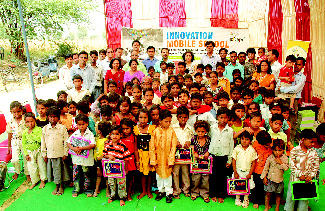About 10 years ago, when young lad Dinesh moved to the City, he was doomed to be a labourer for life. Back in his village Dinesh had studied till Class 6, but had to leave the school as his father shifted to Gurgaon for work. Luckily, one of the activists at All India Citizens' Alliance for Progress & Development (AICAPD) spotted him and took him to the newly-opened Innovation Mobile School in the City. “I never imagined that my son, Dinesh, who did not have any interest in studies before he joined classes at AICAPD, would clear the Class 12th examination. This NGO has changed the life of my son, as well as my family,” says Nirmal, Dinesh’s father. After completing Class 12th, Dinesh cleared ITI, and is now successfully placed at a publication house in Noida.


Migrant labourers like Nirmal have made a huge contribution to the development of the Millenium City, but they still live in poor conditions, and without any access to education for their children. Unfortunately, even proximity to the national capital, and the Right to Education Act, have failed to make any difference. An NGO, AICAPD therefore decided to launch exclusive mobile schools in the City.
The Schools are set up at the place where the migrant families put up their temporary dwellings. The Schools move when the migrants shift their homes to new sites, as their work demands. The brainchild of Sandeep Rajput, Innovation Mobile Schools are set up as temporary structures near construction sites. When a construction project is over, a builder generally employs the same group of labourers on another site; so it becomes easier for the School to move with the labourers. If a child is not able to continue studies at a mobile school, the school helps him/her get enrollment in the National Open School.
“After spending a decade in the City, I realised that more than 1,000 children of migrant labourers have no access to education. So I came up with the idea to set up these special mobile schools,” says Sandeep Rajput, Director, Innovation Mobile Schools (AICAPD). The 33-year-old Rajput comes from a poor farmer family of UP. He left his Masters degree course in 2001, and came to Delhi to take up a simple job at a salary of Rs. 4,000 a month. However, touched by the poor condition of the children of poor migrant workers, he decided to provide free education to them, at their doorsteps. He established the first Innovation Mobile School in South Delhi’s Madangir area, in 2002. “I started teaching about 50 slum children, and got them certificates through distance learning. Sometimes I taught them at night, as I used to work in the day. After moving to Gurgaon, I saw that the migrant construction labourers, who put in so much hard work to construct high rises and buildings of international schools, didn't have the money (or the inclination) to send their children to normal schools. I therefore started a mobile school at a construction site on Sohna Road. There are 3 now, and the fourth school is likely to open on Sheetla Mata Road in 'old' Gurgaon,” he informs. Recently, Rajput’s efforts have been appreciated by IIT Madras and IIT Roorkee. He was invited by these institutions to share his story.
Innovation Night Schools
Apart from the Mobile Schools, the NGO has also set up an Innovation Night school in the City. Over 65 working children attend this School. It has been set up for older children, who work during the day. Unfortunately children are made to work in India. “Very few of these children were able to combine their work with education. Many children had short attendance in schools due to their long work schedules. Through Innovation Night Schools, such working children can now have access to good schooling. They will also not have to look for schools; rather the schools will go to their doorstep,” says Rajput.
After-school Education
The NGO helps the children get admission to various courses through the National Open School. Besides, many students are pursuing their higher education from Delhi University. A few of them are already working in reputed companies. For 23-year-old Kishore Kumar, studying at the Mobile School was a life-changing experience. Kishore, who used to work in a soap factory, was brought to the Mobile School by a volunteer. At the age of 18, he ran away from his village in UP. After coming to the City, he started working in the factory, where he used to get a monthly salary of Rs. 1,600, after working for 12 hours a day. With the help of the NGO, Kumar is today pursuing graduation from DU, and is simultaneously working with an international school and drawing a salary of Rs. 15,000. “I called my parents after joining the Mobile School. My father started crying when he heard that I have passed 12th standard,” says Kumar. Rajput informs that children who work in factories sometimes cut their fingers and hands, while working with heavy machines. “We also take in handicapped children at the Mobile Schools. They are given special training in computers, which helps them in getting good jobs,” he says.
Many Gurgaon children (mainly those who have passed school) take out a few hours a day to teach kids at the Mobile Schools. They also provide their old books, blankets and clothes to the children. “It’s the 'each-one-teach-one' rule that we are trying to put to practice,” smiles Rajput.
Challenges
To start with, Rajput had a tough time finding shelters to put up a Mobile School. After convincing the local authorities, Rajput set up a temporary tent structure at a construction site near Bhondsi. “Initially, even the labourers didn’t want a school at a construction site. Children too were angry, as we forced them to study. But with the help of citizen volunteers, we were able to give the right counselling to children, as well as their parents. And today, over 300 students are attending Mobile Schools on Sohna Road itself,” says Rajput.
A teacher at Jail Road, Sohna adds, “The biggest challenge is to encourage these children to study – for which you have to make the studies very interesting. That is why we use many innovative ways – like puppet shows and story-telling.” These children live away from their parents, which makes them vulnerable to drug addiction and human trafficking. The Mobile Schools not only provide education to these children, but also help keep them away from such evils.
Future plans
The NGO plans to set up Innovation Model Schools, and an Innovation Mobile Library. Innovation Model Schools will be aimed for 'special' students, studying in different Innovation Mobile/Night Schools. Those parents who recognise the importance of education, and agree to relieve their children from domestic work, to continue their studies as full-time students, will be allowed to send their children to the Innovation Model Schools. These Model Schools will provide certificate-level vocational training, beyond the compulsory Primary Education that is provided at Innovation Mobile/Night Schools. These Schools will also run a number of other skill-development programmes, in order to make the children self-reliant. After completion of their formal education upto Secondary level, these children will be encouraged to join government schemes/programmes at different levels, and participate in competitive examinations. The Innovation Mobile Library will offer access to good books and study material.
A survey by the NGO reveals that 50 such schools are needed at various construction sites in the City. It is time for the Administration and the real estate majors to also contribute.
Read More...